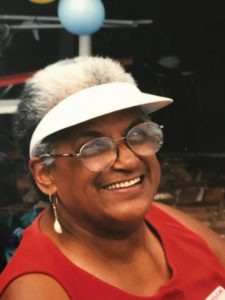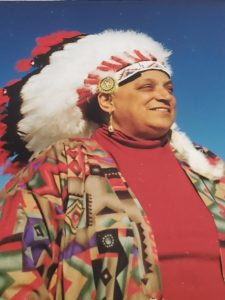“Away from the stressed, overcrowded cities and to your open arms I came seeking sanctuary, blessing and bliss,” wrote Barbara Stevens, who was known as “Maebush,” about Provincetown. “You were my lighthouse to life.” She may have been born in New Bedford, she wrote, but she “was Mae’d in Provincetown.”

Barbara Edith Stevens died at Provincetown’s Seashore Point on Oct. 19, 2022. She was 86.
Visible in nearly every sphere of Provincetown life — she ran a restaurant; worked at the post office; drove a cab; acted in plays; hosted “Jazz Bush” on WOMR; played the flute, piano, and tennis; wrote poetry and prose; and even had her portrait emblazoned on a nine-seat Cape Air plane — Mae was more than a local character. As she herself put it in a Cape Cod Times interview in 1999, “I’m from the sky, on the ground. I’m everywhere. I’m what you’d call ubiquitous.”
Of Cape Verdean and Wampanoag descent, Barbara was born on Jan. 15, 1936 in New Bedford, where she grew up. Her parents, to whom she dedicated her poetry and prose chapbook Chum & Culls (2003) “for their loving and daring their dreams,” were William and Rita Pinto Stevens.
She was captain of the softball and basketball teams at New Bedford Vocational High School. She graduated in 1955 and was later inducted into the school’s Hall of Fame for her exploits in sports.
Mae received a B.S. from Bridgewater State College in 1959 and soon moved to New York City to begin her career as a teacher of physical education and science.
She first visited Provincetown in 1958, “a beached whale from the miseries of the city,” she said in an interview with Sherry Dranch for the community newsletter Womantide. In 1970, she decided to relocate to Provincetown permanently, first cooking at Howard Johnson’s and then opening a Lebanese food business called Mae’s Mid-East, in the process finding a literal and spiritual home.
After two summer seasons, Mae decided that “twenty-four-hour-a-day work” was too much. After that, “I just lived my life,” she said, “did what I had to do. Bartender, kitchen-woman.” Then, in 1975, after some “traumatic times,” she began her 23-year career as a clerk with the U.S. Postal Service.
There were, however, other things she had to do, such as founding the Provincetown Human Rights Coalition in response to the anti-gay “Save Our Children” rhetoric of Anita Bryant in 1977. “I refuse to be helpless,” she told Dranch, “and I’ve always been an activist in relation to anything I really believed in.”
In addition to her political beliefs, she retained her faith in education and love of sport. She played tennis throughout her adult life and advocated for tennis courts to be built at Provincetown High School. They are still in use today. She taught tennis and mentored many of her students.
Mae was also a talented actor. She performed in Approaching Simone and Bringing It All Back Home at the original Provincetown Playhouse. A review of the playhouse’s 2002 production of A Streetcar Named Desire in Tim McCarthy’s publication Life in Provincetown praised the “memorable detail” of Mae’s portrayal of an “anonymous neighbor strolling across the stage with a lazy, rolling gate, humming ‘I need a man to love.’ ” No matter the size of the part, Mae was always a star.

A talented flautist and pianist, Mae loved music. As a participant in former Poet Laureate Robert Pinsky’s Favorite Poem Project, she read her poems in Provincetown and at Boston University. Much of her work was collected in her Chum & Culls chapbook.
A coworker gave her the nickname Mae Bush in honor of the early Hollywood actress Mae Busch, according to her old friend Jacqueline Lapidus. “Over the years, the two words began to appear as one,” wrote Lapidus this week.
“After forty years of living in that magical place Mae Bush is one of Provincetown’s most memorable voices,” wrote Lapidus in her introduction to Chum & Culls. “The true heart of her work is her evocative recollections of Provincetown’s old-timers, fishermen (and women), drag queens, and all the activities that for centuries have made the village a haven for a broad spectrum of marginal individuals.”
Proud of her Wampanoag and Cape Verdean heritage, Mae was often photographed with her headdress, representative of Provincetown’s present and its precolonial past.
Mae’s six siblings, Kathleen, Richard, Bruce, Robert, William, and Michael, all predeceased her.
She is survived by a host of extended family and friends. She was particularly close with her nieces, Karen (Ruby) Stevens of New York City and Cheryl Stevens-Broadus of Lewes, Del., and her nephew, Jonathan Stevens of Philadelphia. Mae is also survived by her sisters-in-law, Virginia Stevens of Fairhaven, Lydia Stevens of New Bedford, Alexandra MacDonald of Provincetown, Eppy Stevens of Framingham, and Renee Stevens of New Bedford, and by cousins Laura Garrett Williams of Surprise, Ariz. and Anita Turner of Providence, R.I.
A celebration of Mae’s life will be held in the spring of 2023.
